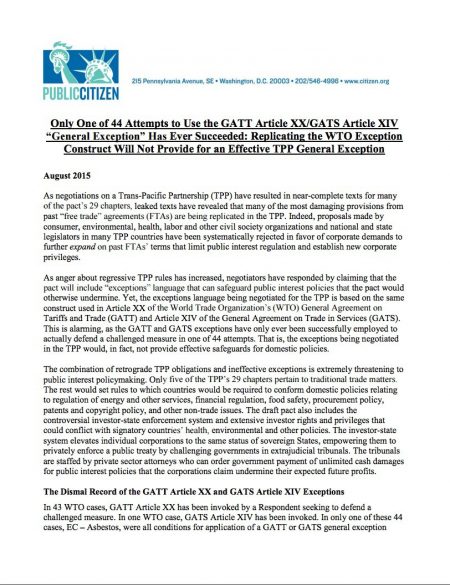Reports Public Citizen: Can countries protect public services using GATS exemptions?
Public Citizen: Can countries protect public services using GATS exemptions?
As negotiations on a Trans-Pacific Partnership (TPP) have resulted in near-complete texts for many of the pact’s 29 chapters, leaked texts have revealed that many of the most damaging provisions from past “free trade” agreements (FTAs) are being replicated in the TPP. Indeed, proposals made by consumer, environmental, health, labor and other civil society organizations and national and state legislators in many TPP countries have been systematically rejected in favor of corporate demands to further expand on past FTAs’ terms that limit public interest regulation and establish new corporate privileges.
As anger about regressive TPP rules has increased, negotiators have responded by claiming that the pact will include “exceptions” language that can safeguard public interest policies that the pact would otherwise undermine. Yet, the exceptions language being negotiated for the TPP is based on the same construct used in Article XX of the World Trade Organization’s (WTO) General Agreement on Tariffs and Trade (GATT) and Article XIV of the General Agreement on Trade in Services (GATS). This is alarming, as the GATT and GATS exceptions have only ever been successfully employed to actually defend a challenged measure in one of 44 attempts. That is, the exceptions being negotiated in the TPP would, in fact, not provide effective safeguards for domestic policies.
The combination of retrograde TPP obligations and ineffective exceptions is extremely threatening to public interest policymaking. Only five of the TPP’s 29 chapters pertain to traditional trade matters. The rest would set rules to which countries would be required to conform domestic policies relating to regulation of energy and other services, financial regulation, food safety, procurement policy, patents and copyright policy, and other non-trade issues. The draft pact also includes the controversial investor-state enforcement system and extensive investor rights and privileges that could conflict with signatory countries’ health, environmental and other policies. The investor-state system elevates individual corporations to the same status of sovereign States, empowering them to privately enforce a public treaty by challenging governments in extrajudicial tribunals. The tribunals are staffed by private sector attorneys who can order government payment of unlimited cash damages for public interest policies that the corporations claim undermine their expected future profits.
GATT WTO TPP
